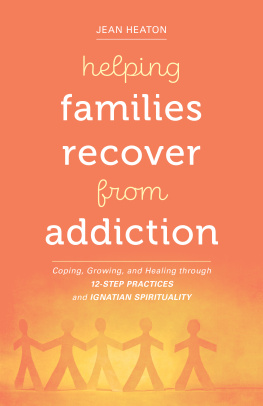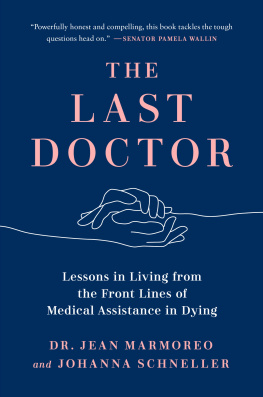LIFE
IN THE
SLOW
LANE
I Live in a Nursing Home
and I Like It
Jean Misura
McKinnon Books
Copyright 2016 by Jean Misura
Life in the Slow Lane: I Live in a Nursing Home and I Like It
Published by McKinnon Books in Dallas, Texas. Visit www.McKinnon-Books.com.
All rights reserved. No part of this book may be reproduced, stored in a retrieval system, or transmitted in any form or by any meanselectronic, mechanic, photocopy, recording, or otherwisewithout written permission of the publisher, except for brief quotations in printed reviews.
Due to medical privacy rights and respect for the dignity of those with mental decline, all names except for family members have been changed.
Aunt Jane by Alden Nowlan used by permission of Nowlans estate and Claudine Nowlan. All rights reserved.
Editor: Kelli Sallman
Cover design: Brett Grimes Design
Interior Design and Typesetting: Draft2Digital
Publishers Cataloging-In-Publication Data
(Prepared by The Donohue Group, Inc.)
Names: Misura, Jean.
Title: Life in the slow lane : I live in a nursing home and I like it / Jean Misura.
Description: Dallas, Texas : McKinnon Books, [2016]
Identifiers: LCCN 2016912645 | ISBN 978-0-9977878-0-1 | ISBN
978-0-9977878-1-8 (ebook)
Subjects: LCSH: Misura, Jean. | Nursing home patientsAnecdotes. | Nursing homesAnecdotes. | Older peopleCareAnecdotes. | Older peopleDignityAnecdotes.
Classification: LCC RC954.3 .M57 2016 (print) | LCC RC954.3 (ebook) | DDC 362.16dc23
Printed in the United States of America
Chronology
Fall 1960 Experiences first onset of multiple sclerosis at age forty
Fall 1967 Receives official MS diagnosis
July 1970 Needs cane
Sept. 1971 Needs wheelchair
July 1976 Confined by gallbladder surgery to hospital bed
May 1977 Youngest daughter earns degree and leaves home
Nov. 1981 Begins herbal and nutritional regimen
Feb. 1982 Divorces Rudy
Mar. 1982 Enters County Home and Infirmary
Aug. 1982 Enters Amherst Nursing Home at age sixty-two
Jan. 1985 Daughter dies
Dec. 1995 Begins journaling
Apr. 1997 Husband dies
Nov. 2008 Dies from natural causes
Prologue
I have spent the past thirteen years in a nursing home.
I n the fall of 1960, multiple sclerosis (MS) began its assault on my lifestyle. I was forty years old. Loss of peripheral vision in my left eye was the first indication that something was wrong. The ophthalmologist said, Go to your family doctor to see if he can find whats causing it. He couldnt. Six years later I went to an internist even though his fee was high. I needed a good diagnostician because my symptoms of weakness and fatigue had become so severe that they could no longer be ignored. Between the internist and a neurologist it was decided I had a demyelinating disease, their euphemism for this invasion that changes the lives of ones whole family. My internist described the disease but never used the words multiple sclerosis . For this I would always be grateful. It removed much of the trauma from the revelation of this dreaded diagnosis.
A demyelinating disease is a disease of the central nervous system. A myelin sheath encases the spinal cord similar to the way insulation protects an electrical cord. Something erodes the myelin in apparently random attacks. This erosion interrupts communication from the brain to whichever area is controlled by the site of the erosion. The involved body parts depend on where along the spinal cord the attacks occur. My legs dont move because, even though my brain is sending out the command, my legs dont receive it. My left arm is also affected. But I am lucky that the MS hasnt affected my speech as it does in some.
The internist recommended taking Lipoflavonoid, a dietary supplement combining vitamin C and some of the B vitamins. He said this sometimes helped if the problem is caught soon enough. Apparently, it wasnt caught soon enough. I began to suspect that I had MS. When I asked the doctor during my annual physical a year later, he admitted thats what it was. By this time I had had it for seven years, so my attitude was, So what else is new, which was a false air of stoicism. I think I infused myself with an emotional numbness.
The etiology of MS is still uncertain. Some in the medical community believe that it is a virus that attacks the myelin. Others think that it is an autoimmune disease where the bodys immune system goes berserk and attacks its own body protein. I tend to agree with the latter theory. Dont know why. Gut instinct, I guess. Incidentally, theres a very high incidence of MS in the Great Lakes region. No one knows how or why this is so.
I was luckier than some. I already had had my family. My daughter Nancy was twenty-three by the time I found out that my diagnosis was multiple sclerosis, seven years after the onset. She was living in Florida. Kathy was eighteen, Susan sixteen, and Peggy twelve. Shortly after the diagnosis, I became a wall-walker, using the furniture and walls to balance myself. I could still handle grocery shopping by using the outside wall of the house and the outside of the car to aid my entrance into the car. The grocery cart supported my supermarket rounds.
In the summer of 1970 I had to face the fact that my disease was progressing. By July I could no longer put off purchasing a cane. I went from cane to walker to wheelchair in fourteen months. My diagnosis may not have been traumatic but my descent into a wheelchair was. I sobbed and sobbed in helplessness. To never be able to walk again! This wasnt real. It was a nightmare.
In July of 1976 I had to have my gall bladder removed. By Christmastime of that year, I realized that the hospital bed we had rented as a temporary convenience during my convalescence would be a continuing necessity. This was one step further into the loss of independence. But nobody ever promised me a rose garden, and it was a damn good thing. Because I sure wasnt getting one.
In 1977 our youngest daughter Peggy graduated with an Associates Degree in radiation therapy and left for her first job treating cancer patients at a hospital one and a half hours from home. Our proximity to a university enabled us to hire students to help transfer me from bed to wheelchair to toilet and back as well as do some cooking and laundry in exchange for room and board. This worked out well for the next four years.
But my condition continued deteriorating, and I eventually realized it was becoming more difficult for just one person to transfer me. I was becoming weaker and less able to put any energy into the transfers. It was also an unpleasant atmosphere in which to try to maintain a normal family life.
Whether I was or not, I felt I was an irritant to my other family household members, which by this time was only my husband. I wasnt sick. I looked healthy. I had a good appetite. I didnt complain. I appeared to be content with having to have all my needs fulfilled by someone else. I wasnt as content as I appeared to be, but I didnt do a lot of complaining about my lot in life.
My husband Rudy had his own business, which made more demands on him than a nine-to-five job would have. He was a furriernot a fur merchanta true furrier. He made garments out of fur collars and other used but still good pieces of fur. He thus was able to sell them more cheaply than furriers who sold new garments.
When he came home after work, instead of having a wife who had dinner ready and a comforting embrace, he found a wife who needed to be waited on. Our marriage had not been a smooth one for many years. Rudy was paranoid, which made him difficult to live with. Both of us were stubborn. What little patience he had gradually eroded, and I felt he would be happier if he were free to make a life for himself. And I would be happier in a friendlier environment, among professionals who were paid to cope with problems like mine.
Next page







